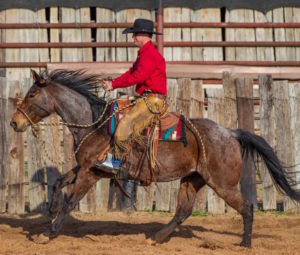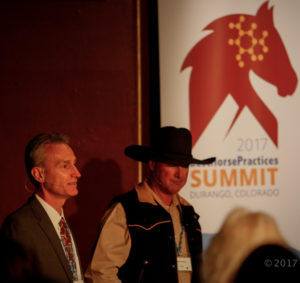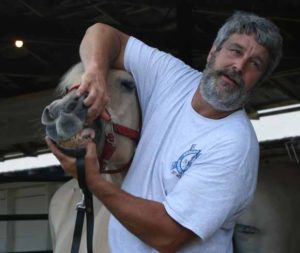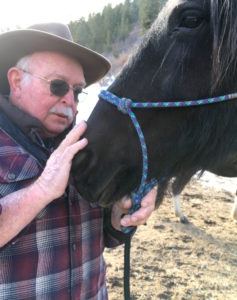
Martin Black
Horseman Martin Black grew up on the Ace Black family ranch in Bruneau, Idaho, and was influenced by his father, grandfather Albert and uncle Paul Black. After school he worked on ranches in Idaho, Nevada, and California, working with top horsemen and bridlemen, Charlie and Bill Van Norman, Ray Hunt, and Tom Dorrance, among many others.
Over the years, he has started thousands of colts and now travels throughout the U.S., Europe, and Australia, offering horsemanship, ranch, and roping clinics. He is the co-author with Dr. Steve Peters, of Evidence-Based Horsemanship.
Here, Black weighs in on the debate – some might call it a battle – between those favoring equine dentists or veterinarians for dental care.
Martin Black writes:

Black presents with Dr. Steve Peters at 2017 BHP Summit
Equine dentistry is becoming a popular topic recently in the horse world. Along with the demand for the service comes a battle between two groups providing the service: certified equine dentists (CEDs) and doctors of veterinary medicine (DVMs).
I am no expert on anything. I have no PhD, DVM, or even a CED. But I start over 350 head of colts and work with over 1,000 head of horses on an annual basis, and have for the last decade.
I have family members and friends who are DVMs and CEDs and I have no bias toward either one. But what I experience in my travels and what I read disturbs me.
I think anyone that cares about their horses needs to educate themselves on equine dentistry and the politics that are being shoved down our throats. Some states are trying to define existing laws and pass new laws that that would only allow a DVM, or persons assisted by a DVM to practice equine dentistry.

Photo by Kathy McCarty/Presque Isle Star-Herald Steven Akeley, a licensed equine dentist, demonstrates on his horse, Tori, what to look for when checking a horse for dental problems
One of the arguments vets have is that the equine dentists are not licensed to administer drugs to a horse. This may be law, but I don’t’ see vets coming down on farriers, horse transporters, and others who use tranquilizers. In fact, most often, the vets supplied those tranquilizers and trust them to use the drugs responsibly.
My interest is what’s best for the horse. There is no monetary gain to me whether a DVM or a CED works on my horses or my client’s horses.
My concern is if the DVMs have their way, then only a vet or a vet-assisted person could provide dental care. It means that we are paying more for the service.
And what is the quality of service? Vets have limited training for dental work, while CEDs train exclusively for it.
My personal experience has taught me that the vast majority of vets working on horses’ mouths are not doing proper work. When I discuss performance floats or bit seats and how they are suppose to function, these vets are often ill-informed.
The need for equine dentistry exceeds the number of qualified professionals available to do the work. Excluding the CEDs would only create a larger void.

Equine dentist Phil Ratliff examines a horse
If vets are truly concerned with the horses and the horse owners, they should support the establishment of a certifying board represented by DVMs and CEDs, to approve a unbiased list of “Qualified Equine Dentists” based on their ability and effort. Applicants need to be judged on their performance of equine dentistry, not how long they went to school and how much money was spent on knowledge unrelated to equine dentistry.
Good Luck and God Bless,
Martin Black
Thanks Martin. The scope of practice battle continues in all the health professions. Vets/farriers/CEDs, Physical Therapists/Massage Therapists/Chiropractors/MDs/Osteopaths…. I always tell people it’s the skill of the practitioner that matters more than the letters attached. Yet, it’s easy to bamboozle people if they haven’t done their own research first. If the AMA and AVA had their way, NO one would be able to practice without their supervision. Phooey.
Then again, how many times does a person have to successfully work on a horse’s teeth before he/she is deemed to be competent? How many horses does a person have to ruin before he/she is deemed incompetent? To state that an individual’s qualifications in any field should be based solely on their performance is irresponsible. There must be a mark an individual must meet before starting actual practice.
There must be some kind of regulation in the industry to determine some sort of fundamental qualification as a base or starting point. There must be some sort of certifying body. Whether certification is based solely on education or apprenticeship or a combination of the two is the topic that we should be discussing.
I know of at least two horses that died as a direct result of an incompetent horse dentist’s work on them. I know of at least two others that were saved by the work of a competent horse dentist. I also have personally been referred to a horse dentist by a DVM, who indicated my horse needed his teeth done, when, in fact, there was no need for it. I discovered later the CED was working under the DVM’s supervision (per Arizona law) and the DVM was receiving a commission for each horse the CED worked on.
There is no single right answer, but there definitely is a need for a regulatory agency or association in the industry.
I agree with your response. I have seen many horses that have suffered at the hands of incompetent dentists that i have had to fix. I work primarily with thoroughbreds. I have no diploma from any school. But at all the race tracks i have worked at i was required to demonstrate my skills for the head veterinarian at that respective track before being allowed to practice. Not to brag but i have never been turned down by said vets. I was lucky. I had a very good teacher to apprentice under and had a love for the animals which made me want to do right by them. I think most get into the business for the money. It becomes a numbers game. Zip through and move on to the next and watch the money add up.
If a dental hygienist is licensed to clean teeth and goes thru 2 to 4 years of training, both
academical snd clinically, aren’t they MORE
qualified to do a prophylaxis than a dds?
So if an equine dentist student goes thru 3 to 4
6 werk sessions of training for a very specific job, they know more about it.
Yes, they study anatomy, histology and physiology..along with clinical study.
Dont quite understand why DMV s are so against it!
I am an equine dentist. I am not certified by any school. I was taught by my father who is considered one of the best in the north east. I have 16 yrs of experience. In those years i have worked on thousands of horses and seen many different issues and situations. I agree with Mr. Black. There are vets that will do a good job on a horses mouth. But in my experience most do not like to do the job.
I take great pride in my work. I strive to not only make the horse owners or trainers happy, but i want to make the horse happy. That should be the goal of any equine dentist. The horses health and well being should be first and foremost.
My advice to anyone looking for an equine dentist us to do your research. Ask around. Just because the person may not have a lot of credentials does not mean they are not capable. I live off of word of mouth. I’ve built a solid reputation for doing excellent work and being knowledgeable.
My last point is this. An equine dentist makes his living working on the horses mouth. If he/ she does a sub par job thats money lost. A vet is more valuable to the horse. They can do a terrible job on the mouth but you still need them to care for the animals medical needs. Where is the incentive to do good work?
Jason you are not an equine “Dentist”
That title is reserved for Veterinary Doctors who have also met the American College of Diplomats requirements for Equine Dentistry Boarding.
You are a lay floater and possibly may know something about balancing the occlusal surfaces … or not.
I am a doctor who sees 1.5-2 thousand horses per year for dental balancing and I do not call myself a dentis I call it a dental specialty practice.
As far as work – given the relaxation needsd to critique the dynamic balance of my
Own work and to use a light and properly fitted speculum carefully and examine and do goid work in all areas of the mouth – my opinion is that almost 100% of horses need some level of sedative. That means an exam prior, heart rate, heartbeat quality, dehydration, level and general health should be assessed prior to sedating the horse. And legally, that requires a veterinarian to make a medical judgement. I would be the first to admit that not all vets are good at dental balancing, not all vets are good at assessing advancing dental disease horses. And whether a lay floater or a veterinarian is involved in the procedure everyone needs to know when to pass it over to either a more advanced veterinarian who or possibly a “dentist” diplomat who can assess major problems better.
So in my mind, the owner needs to the gatekeeper. They should have seen from the front to the back of their horses mouth when anyone is in there working on it and they should be able to have any questions answered about why someone is doing something for the horses care. And horses should rarely be sore and never if healthy with decently cared for teeth have any problems eating afterwards.
And as a practitioner, if there are questions that I don’t readily have the answer for then I should seek someone more knowledgeable on the horses behalf.
And in case less educated contributors here did not know it ….veterinarians take a veterinary oath to do no harm and to do our best to advance animal health and well-being and after 12 years of school and almost a half million invested in my lifetime of education -I can honestly say that that is my goal for every animal every day.
This is one topic you should probably just shut your mouth about. Just stick to training horses, and set your ego aside. You clearly have no idea what you’re talking about. Why anyone would even put your words in print is unsettling.
When you go through vet school, then you will have permission to speak on this subject.
Until then, you have zero tespect from me…and trust me, probably many vets too. It will be interesting to see how your local vets treat you after this piece of work.